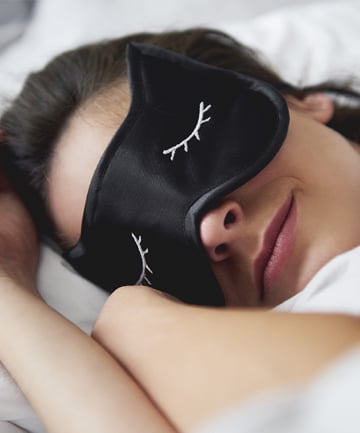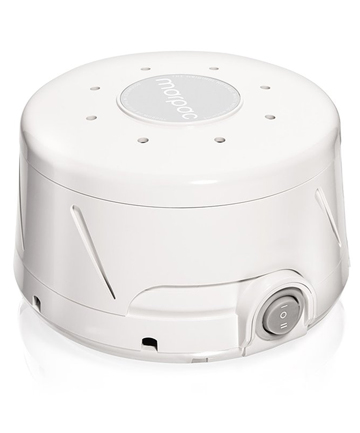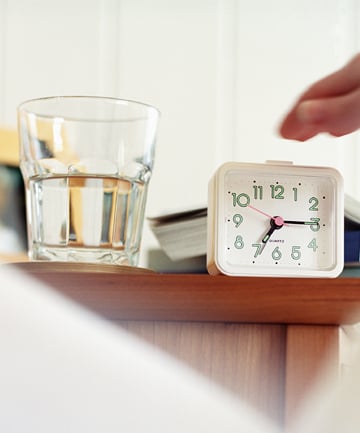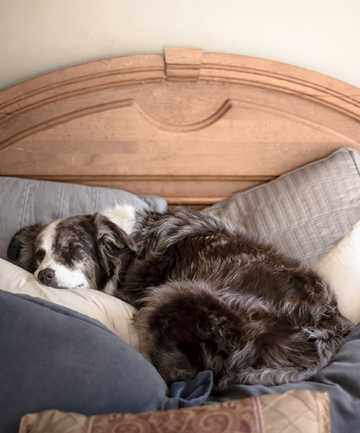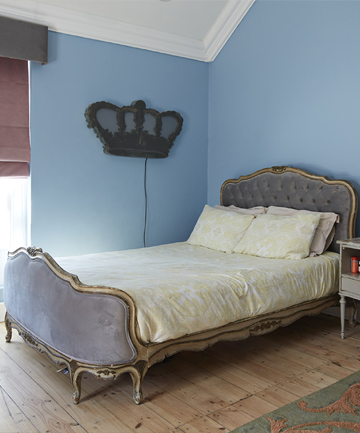Wong explains that your melatonin production is extremely sensitive to light. "While our eyes contain a large portion of receptors for light, it turns out these receptors can be found in our skin too!" she says. "Even if you sleep an adequate amount, the quality of your sleep will be negatively impacted by a light or dimly lit room." For this reason, it's best to sleep in a pitch-black environment with all lights completely off. "The total darkness helps melatonin do its thing without interruption," she says. If outside variables are keeping your bedroom from being dark, consider purchasing blackout curtains or shades or using an eye mask at night.
Image via Westend61/Getty
Another important factor that could interrupt your sleep quality is intermittent noises at night. "Cars passing on the street, busses zooming by, airplanes overhead, dogs barking, snoring partners — all of these noises have the potential to wake you up at night," says Wong. If your bedroom is in an area prone to intermittent noise at night, she recommends using some sort of white noise, like Marpac Dohm Classic White Noise Sound Machine, $44.95. "White noise creates a consistency in your aural environment that is harder to interrupt, which makes it less likely that you'll wake up in the middle of the night by a passing car or a loud roommate," she says. High-quality earplugs, like Bose Noise-Masking Sleepbuds, $249.95, are another solution, and especially come in handy when you're traveling.
In addition to being an eyesore, bedroom clutter might just cost you a good night's sleep, according to Dr. Brown. "Clutter says chaos rather than order and calm and represents tasks undone that can create a negative tone just by encountering it," he says. He suggests thinking of your bedroom as a sleep sanctuary, ensuring that it is serene, relaxing and pleasing. "If possible, avoid storing things underneath the bed, as this is still a distraction, and keep your bedside table uncluttered as well," he says.
Image via Louis Turner/Photodisc/Getty
Are you sharing your bed with your partner, two cats, a dog and an occasional toddler? While sometimes these factors are out of your control, Dr. Brown recommends having a separate bed for everybody — pets included. "If you like your pets in your room, but find them hogging the bed, try moving them off the bed into a pet bed onto the floor of your room," he says. "Toddlers tend to move a great deal while sleeping and will almost certainly disrupt your sleep, so try to enforce that they sleep in their own bed so you both get a better night's sleep."
Image via Jon Paciaroni/Moment/Getty
Shades of blue are the best for sleep, as they promote longer slumber, according to Brantner. "The ganglion cells in our eyes help send our brain info that regulates our circadian rhythm, and those cells are sensitive to blue," he says. "Blue is also associated with calmness, which can help reduce your heart rate and blood pressure to get you to sleep." Of course, blue isn't for everyone, so other suitable options include greys and similar neutral hues. "While people say red stimulates passion, I'd do my best to stay away from any harsh colors," he adds.
Image via Klaus Vedfelt/DigitalVision/Getty


